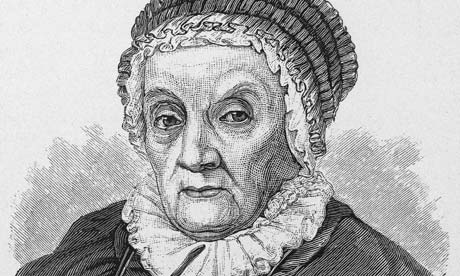 Caroline Lucretia Herschel (16 March 1750 – 9 January 1848) was a German astronomer and the sister of astronomer Sir William Herschel, with whom she worked throughout both of their careers. Her most significant contributions to astronomy were the discoveries of several comets and in particular the periodic comet 35P/Herschel-Rigollet, which bears her name. She was the first woman to be paid for her contribution to science, to be awarded a Gold Medal of the Royal Astronomical Society (1828), and to be named an Honorary Member of the Royal Astronomical Society (1835, with Mary Somerville). She was also named an honorary member of the Royal Irish Academy (1838). The King of Prussia presented her with a Gold Medal for Science, on the occasion of her 96th birthday (1846).
Caroline Lucretia Herschel (16 March 1750 – 9 January 1848) was a German astronomer and the sister of astronomer Sir William Herschel, with whom she worked throughout both of their careers. Her most significant contributions to astronomy were the discoveries of several comets and in particular the periodic comet 35P/Herschel-Rigollet, which bears her name. She was the first woman to be paid for her contribution to science, to be awarded a Gold Medal of the Royal Astronomical Society (1828), and to be named an Honorary Member of the Royal Astronomical Society (1835, with Mary Somerville). She was also named an honorary member of the Royal Irish Academy (1838). The King of Prussia presented her with a Gold Medal for Science, on the occasion of her 96th birthday (1846). Caroline Lucretia Herschel was born in the town of Hanover on 16 March 1750. She was the eighth child and fourth daughter of Isaac Herschel and his wife, Anna Ilse Moritzen. Isaac became a bandmaster in the Guards, was away with his regiment for substantial periods, and suffered ill-health after the battle of Dettingen in 1743. At the age of ten, Caroline was struck with typhus, which stunted her growth, so that she never grew past four-foot three.[1] Her family assumed that she would never marry and her mother felt it was best for her to train to be a house servant. Her father wished her to receive an education, but her mother opposed this. Her father sometimes took advantage of her mother's absence to teach her directly or include her in her brother's lessons. Caroline was allowed to learn millinery and dress-making and worked hard at various types of fancy-work, with a view to someday supporting herself.
Caroline Lucretia Herschel was born in the town of Hanover on 16 March 1750. She was the eighth child and fourth daughter of Isaac Herschel and his wife, Anna Ilse Moritzen. Isaac became a bandmaster in the Guards, was away with his regiment for substantial periods, and suffered ill-health after the battle of Dettingen in 1743. At the age of ten, Caroline was struck with typhus, which stunted her growth, so that she never grew past four-foot three.[1] Her family assumed that she would never marry and her mother felt it was best for her to train to be a house servant. Her father wished her to receive an education, but her mother opposed this. Her father sometimes took advantage of her mother's absence to teach her directly or include her in her brother's lessons. Caroline was allowed to learn millinery and dress-making and worked hard at various types of fancy-work, with a view to someday supporting herself. Following her father's death, her brother William proposed that she join him in Bath, England, "to make the trial if by his instruction I might not become a useful singer for his winter concerts and oratorios". Caroline eventually left Hanover on 16 August 1772, and accompanied her brother William back to England. There she took on the responsibilities of running his household, and learning to sing. William had established himself as an organist and music teacher at 19 New King Street, Bath, Somerset (now the Herschel Museum of Astronomy). He was also the choirmaster of the Octagon Chapel. William was busy with his musical career and became fairly busy organising public concerts. Caroline took several singing lessons a day from William. She became the principal singer at his oratorio concerts, and acquired such a reputation as a vocalist that she was offered an engagement for the Birmingham festival. She declined to sing for any conductor but William. But it appears that Caroline did not blend in with the local society and made few friends.
Following her father's death, her brother William proposed that she join him in Bath, England, "to make the trial if by his instruction I might not become a useful singer for his winter concerts and oratorios". Caroline eventually left Hanover on 16 August 1772, and accompanied her brother William back to England. There she took on the responsibilities of running his household, and learning to sing. William had established himself as an organist and music teacher at 19 New King Street, Bath, Somerset (now the Herschel Museum of Astronomy). He was also the choirmaster of the Octagon Chapel. William was busy with his musical career and became fairly busy organising public concerts. Caroline took several singing lessons a day from William. She became the principal singer at his oratorio concerts, and acquired such a reputation as a vocalist that she was offered an engagement for the Birmingham festival. She declined to sing for any conductor but William. But it appears that Caroline did not blend in with the local society and made few friends.